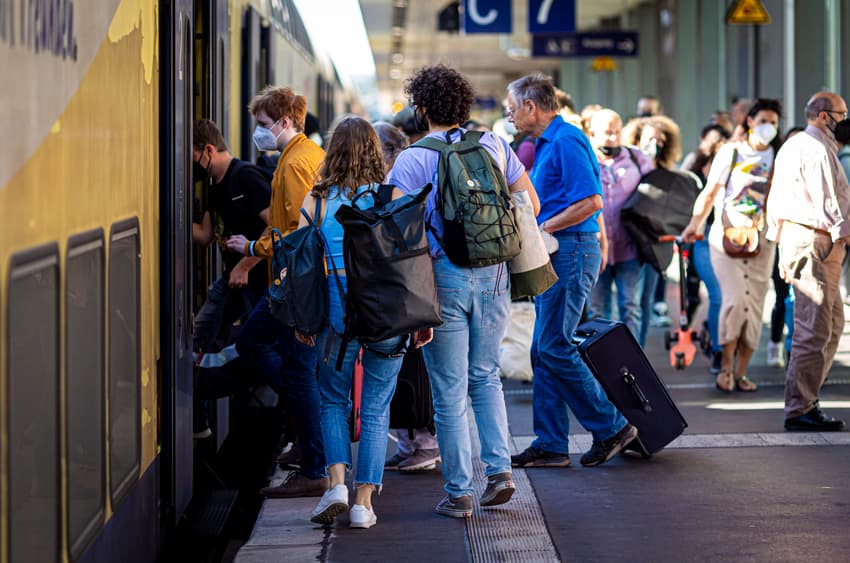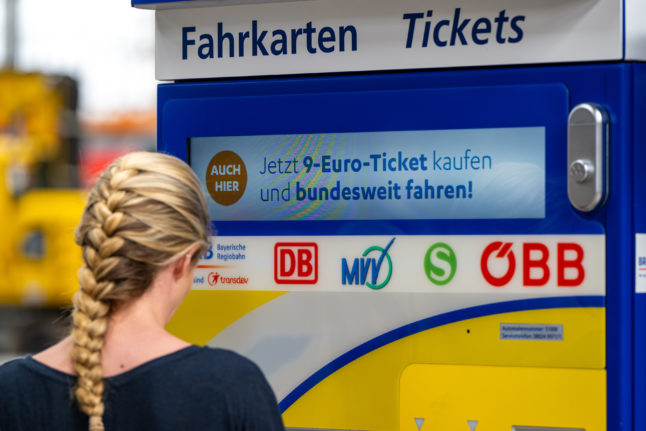Can German ministers agree on funding for a €9 ticket follow-up?

Germany's state and federal transport ministers are thrashing out plans for the successor to the €9 ticket. But concerns about funding public transport amid the energy crisis are still a big sticking point.
The €9 ticket, which was in place in June, July and August, brought public transport in Germany to the top of the agenda.
It meant that people were able to ride buses, trams, the U-Bahn - and even regional trains - across German local transport networks at a heavily reduced price.
Due to the success, the federal government has pledged to make €1.5 billion available for a follow-up to the €9 ticket.
The ticket is set to be introduced by January 2023 and will rely on Germany’s 16 states matching or exceeding the federal government’s cash injection.
READ ALSO: What we know so far about the successor to Germany’s €9 ticket
So far, the proposals are for a monthly ticket that would be valid on public transport nationally, with the price somewhere between €49 and €69.
However, politicians and associations are pointing out that public transport in Germany has been underfunded for some time, and that will get worse due to the energy crisis.
The biggest problem is that "in view of the massive increase in energy costs, the funds are not sufficient to finance existing local public transport," said Reinhard Sager, president of the German Association of Districts (DLT).
Prices for construction services, staff and energy costs have risen "dramatically," he said. "Therefore, under no circumstances should we risk liquidity bottlenecks or even operational closures at transport companies," said Sagar. He warned that without proper financing there could be "cancellations" across services and said, "more money in the system" is necessary.
The current discussion has been going in the wrong direction for weeks, Sager said. "The experience with the €9 ticket shows that expanding the offer is more important than a very cheap ticket," he added.

A woman in Munich purchases a €9 ticket from a ticket machine. Photo: picture alliance/dpa | Lennart Preiss
However, there does appear to be strong support for a new ticket - as long as it includes a plan for general funding for public transport.
North Rhine-Westphalia's transport minister Oliver Krischer (Greens) has called for a quick agreement on the €9 successor model, and an overall strong financing plan for local public transport. "The €9 ticket was a successful model. What is clear is that a new ticket must continue to be cheap and simple," he told RedaktionsNetzwerk Deutschland (RND).
"I now perceive a high level of willingness among the states to quickly hold concrete talks on a follow-up arrangement and bring them to a conclusion," the Green politician stressed. "Nevertheless, we need overall financing that also includes the expansion of public transport."
Krischer said he feared a reduction in the range of services on offer because of the high costs of the transport associations.
"The best ticket is only worth half as much if the federal states and local authorities have to significantly reduce the range of services on offer because of the enormous cost increases," he said. "But that's exactly what could happen if the federal transport minister doesn't keep his financial commitments."
The German Association of Towns and Municipalities urged a quick agreement from the federal and state governments.
"The federal government's proposals are on the table, now it's the states' turn," chief executive Gerd Landsberg told RND. "In the course of the new regulation, the price of the ticket is not the most important thing, but ensuring the efficiency of local transport."
Landsberg also warned of rising energy costs, which already posed major financial challenges for transport operators.
"However, we must not only absorb these costs, but also ensure that the expansion of local public transport makes progress and that the frequency is improved," he urged. "Only an attractive public transport offer will inspire people to use public transport, even after the €9 ticket."
Transport ministers will be debating the ticket via video link on Monday. Federal Transport Minister Volker Wissing (FDP) has held out the prospect of implementing a successor model at the beginning of the year. Meanwhile, the state of Berlin has already moved ahead and announced a €29 city ticket for the months of October, November and December.
READ ALSO: What we know so far about Berlin's €9 ticket follow-up
Comments
See Also
The €9 ticket, which was in place in June, July and August, brought public transport in Germany to the top of the agenda.
It meant that people were able to ride buses, trams, the U-Bahn - and even regional trains - across German local transport networks at a heavily reduced price.
Due to the success, the federal government has pledged to make €1.5 billion available for a follow-up to the €9 ticket.
The ticket is set to be introduced by January 2023 and will rely on Germany’s 16 states matching or exceeding the federal government’s cash injection.
READ ALSO: What we know so far about the successor to Germany’s €9 ticket
So far, the proposals are for a monthly ticket that would be valid on public transport nationally, with the price somewhere between €49 and €69.
However, politicians and associations are pointing out that public transport in Germany has been underfunded for some time, and that will get worse due to the energy crisis.
The biggest problem is that "in view of the massive increase in energy costs, the funds are not sufficient to finance existing local public transport," said Reinhard Sager, president of the German Association of Districts (DLT).
Prices for construction services, staff and energy costs have risen "dramatically," he said. "Therefore, under no circumstances should we risk liquidity bottlenecks or even operational closures at transport companies," said Sagar. He warned that without proper financing there could be "cancellations" across services and said, "more money in the system" is necessary.
The current discussion has been going in the wrong direction for weeks, Sager said. "The experience with the €9 ticket shows that expanding the offer is more important than a very cheap ticket," he added.

However, there does appear to be strong support for a new ticket - as long as it includes a plan for general funding for public transport.
North Rhine-Westphalia's transport minister Oliver Krischer (Greens) has called for a quick agreement on the €9 successor model, and an overall strong financing plan for local public transport. "The €9 ticket was a successful model. What is clear is that a new ticket must continue to be cheap and simple," he told RedaktionsNetzwerk Deutschland (RND).
"I now perceive a high level of willingness among the states to quickly hold concrete talks on a follow-up arrangement and bring them to a conclusion," the Green politician stressed. "Nevertheless, we need overall financing that also includes the expansion of public transport."
Krischer said he feared a reduction in the range of services on offer because of the high costs of the transport associations.
"The best ticket is only worth half as much if the federal states and local authorities have to significantly reduce the range of services on offer because of the enormous cost increases," he said. "But that's exactly what could happen if the federal transport minister doesn't keep his financial commitments."
The German Association of Towns and Municipalities urged a quick agreement from the federal and state governments.
"The federal government's proposals are on the table, now it's the states' turn," chief executive Gerd Landsberg told RND. "In the course of the new regulation, the price of the ticket is not the most important thing, but ensuring the efficiency of local transport."
Landsberg also warned of rising energy costs, which already posed major financial challenges for transport operators.
"However, we must not only absorb these costs, but also ensure that the expansion of local public transport makes progress and that the frequency is improved," he urged. "Only an attractive public transport offer will inspire people to use public transport, even after the €9 ticket."
Transport ministers will be debating the ticket via video link on Monday. Federal Transport Minister Volker Wissing (FDP) has held out the prospect of implementing a successor model at the beginning of the year. Meanwhile, the state of Berlin has already moved ahead and announced a €29 city ticket for the months of October, November and December.
READ ALSO: What we know so far about Berlin's €9 ticket follow-up
Join the conversation in our comments section below. Share your own views and experience and if you have a question or suggestion for our journalists then email us at [email protected].
Please keep comments civil, constructive and on topic – and make sure to read our terms of use before getting involved.
Please log in here to leave a comment.